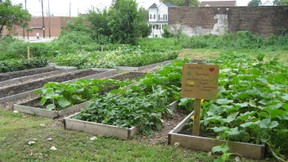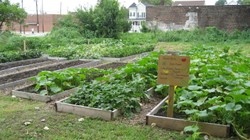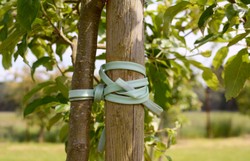In Cleveland, Ohio, community gardens are springing up in pockets all over the city, deep in urban neighborhoods, at senior centers, inner ring suburbs, and in empty plots between houses or office buildings. Community gardens are a good project for people of any age, from any ethnic background, and a perfect way to educate inner city youth on proper nutrition, and where food comes from. Community gardens offer community residents a chance to work together, and to get fresh air and exercise while they learn to grow fresh produce for their own meals.

Summer Activities: Start a Community Garden
Community gardens are fast becoming a great way to meet neighbors, educate urban residents about growing fresh vegetables, and get sedentary elderly to exercise and go outside.

Some community gardens are built in former parking lots, while others are found in empty plots of land that have lain fallow for years. Some gardens are only a few feet in diameter, while others are a few acres. The interesting fact about community gardens is that it only takes a few volunteers, and a donation of tools and seeds to get the garden started. This is a great project to keep teenagers busy, while allowing them to help feed their families and contribute to the community in a positive way.
Cities that are Creating Uban Community Gardens
Should You Start a Community Garden in Your Neighborhood?
Land, volunteers, and funding
If you are considering starting a community garden in your neighborhood, this is a good time to start one. Many neighborhoods are in possession of empty lots or homes that are abandoned. A community garden can bring together a community, provide both sustenance and income, and build morale in a community devastated by the foreclosure economy we currently live in.
Even the poorest neighborhood can start a community garden with charitable funding and a helping hand by knowledgeable gardeners, so look for organizations that have been successful at growing urban gardens in other nearby neighborhoods, and find out how to apply for assistance.
Your garden can be any size, and can start quite small, and grow larger as more and more volunteers and community partners are persuaded to help. Look for businesses that are nearby to help with donations of money, tools, machinery, plants, and seeds. Many local colleges and universities have programs run by students that will help get a community garden started, lending a hand with the planning, planting, and education necessary.
Beginner Gardening Books
 |
| The Old Farmer's Almanac Vegetable Gardener’s Handbook: E... Old Farmer's Almanac |
 |
| Raised-Bed Gardening for Beginners: Your Guide to Growing... Callisto |
 |
| The Complete Gardener's Guide: The One-Stop Guide to Plan... DK |
Community Garden Resources
 |
| The Community Gardening Handbook: The Guide to Organizing... CompanionHouse Books |
 |
| Our Community Garden Aladdin/Beyond Words |
 |
| Start a Community Food Garden: The Essential Handbook Timber Press Only $4.62 |
Community Garden Benefits
Community gardens have numerous benefits for a neighborhood. Besides the garden itself, there is the interaction of neighbors, creating a better community environment for everyone. Active communities are more bound to notice strangers who are causing trouble, and keeping them out of the area. Neighbors become more social, keeping away loneliness and depression in the elderly, and involving youth who might otherwise be getting into trouble.
Urban gardens offer the chance of exercise, digging in the earth, understanding the growing cycle, and an income opportunity for those who wish to sell their vegetables at local farmers markets. Urban communities have access to more fresh vegetables, provide for their own food, and often donate a portion of their produce to local food banks, and soup kitchens.
How Can I Volunteer at a Local Community Garden?
Community gardening is fast becoming a growing passion in cities. If you would like to help in a garden that is in your local area, then search the internet for urban community gardens, ask at local colleges and high schools, and city hall. This is a good start to finding out what gardens are tucked away in your city.
Many high schools are now involving their students in community gardens or starting one through high school clubs. These gardens need to be tended even while students are on summer break, and neighborhood residents are sure to be welcomed as volunteers.
You can also check youth centers, senior centers, and local churches for community gardens.
More Summer Activities
You might also like
Gardening in Difficult ConditionsSome gardens thrive despite the conditions due to the skill and dedication of...
Weather-proof your gardenIn times of climate change gardeners need to ensure that they have the best p...






 Best Father-to-be Bookson 06/04/2013
Best Father-to-be Bookson 06/04/2013
 Gothic Garden - Black Flowerson 05/20/2011
Gothic Garden - Black Flowerson 05/20/2011
 Leatherwork: The Art of Working with Leatheron 03/14/2013
Leatherwork: The Art of Working with Leatheron 03/14/2013
 Contemporary Desk Lamps for Home or Officeon 08/29/2012
Contemporary Desk Lamps for Home or Officeon 08/29/2012


Comments
Besides the home garden, the public gardens would work for me. When I get a bit more time, but visiting helps, too.
I see them all over the place here in New Hampshire and I just might get involved by next season.
This is my first year in a community garden and I am enjoying it very much. They are certainly growing in popularity and that will not change if food prices keep going up.
Working in a garden is so much fun and very relaxing, I find.
@Jimmie, yes the benefits are many, and there are hardly any drawbacks.
Would love to have access to a community garden. What a great way to foster relationships and be frugal all at once.